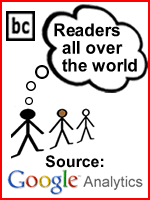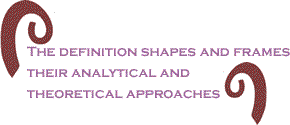|
Black
History Month is that time of year when the achievements
and courage of people of African descent are acknowledged
and celebrated.  However,
for decades now, Black History Month has not once acknowledged
or celebrated the contributions of its lesbian, gay, bisexual,
transgender, and queer communities. However,
for decades now, Black History Month has not once acknowledged
or celebrated the contributions of its lesbian, gay, bisexual,
transgender, and queer communities.
Our omission from the
annals of black history would lead you to believe that the
only shakers and movers in the history of people of African
descent in the U.S.
were and still are heterosexuals. And because of this heterosexist
bias, the sheroes and heroes of LGBTQ people of African
decent like Pat Parker, Audre Lorde, Essex Hemphill, Joseph
Beam, and Bayard Rustin, to name a few, are most known and
lauded within a subculture of black life.
Along with the pantheon
of noted black heterosexual leaders who will be lauded this
month, I want to personally celebrate one of my queer and
crossover sheroes, renown writer and poet Alice Walker for
giving black women everywhere on the globe a new name we
all can embrace - “womanist.”
While “sistah girl”
is my favorite term to depict black women, no word, however,
captures the totality of women of the African Diaspora in
popular culture today than Pulitzer Prize author, Alice
Walker’s, term “womanist.” Alice Walker coined the term
in her 1983 collection of prose writings “In
Search of Our Mothers' Gardens: Womanist Prose.”
The term “womanist”
derives from African-American women’s folk expression “You
are acting womanish”. The phrase illustrates little African-American
girls’ precociousness as they attempt to comprehend and
overcome the challenges adult African-American women face
in their strategies for survival in an oppressive society.
Walker
defines a “womanist” as a black feminist who continues the
legacy of “outrageous, audacious, courageous, and willful,
responsible, in charge, serious” African-American women
as agents of social change for the wholeness and liberation
of their entire people, and by extension, the rest of humanity.
A womanist can be a lesbian, a heterosexual, a bisexual
or a transgender woman. She celebrates and affirms African-American
women’s culture and physical beauty. A womanist “loves herself.
Regardless”.

“Womanist” was coined
as a term that is both culture specific and encompasses
a variety of ways in which women of the African Diaspora
support each other and relate to the world.
Walker
specifically devised the term in response to literary historian
Jean Humez’s (who resides here in Somerville, MA) introductory statement in “Gifts
of Power: The Writings of Rebecca Jackson, Black Visionary,
Shaker Eldress.” Humez suggested that Rebecca Jackson
and Rebecca Perot, who were part of an African-American
Shaker settlement in Philadelphia in the 1870’s and lived with each other for more than
thirty years, would be labeled lesbians in today’s climate
of acknowledging female relationships. Humez supported her
speculations of the Jackson-Perot relationship by pointing
to the homoerotic dreams the women had of each other. Walker
disputed Humez’s right, as a white woman from a different
cultural context, to define the intimacy between two African-American
women.” “Womanist” was coined as a term that was both culture
specific and encompassed a variety of ways in which African-American
women support each other and relate to the world.
Although the words “religion”
and “Christian” do not appear in Walker’s
definition, there are both religious and secular usages
for the term “womanist.” Because Walker
emphasizes African-American women’s love for the Spirit,
African-American Christian women have used “womanist” to
articulate their witness to and participation in God’s power
and presence in the world. “Womanist” in the religious sense
is often used by African-American women who are Christian
ministers and seminarians, as well as by feminist scholars
in the field of religion. Womanist Christian thought and
practices began to flourish in the mid-1980s as a way to
challenge racist, sexist, and white feminists’ religious
practices and discourses that excluded African-American
women’s participation and which ignored their experiences
in church and society.
 For
womanist Christian ministers and seminarians, Walker’s definition serves as a springboard for
their preaching style, liturgy, and pastoral ministry. For
womanist Christian academicians, the definition shapes and
frames their analytical and theoretical approaches. By using
African-American women’s experiences of struggle and survival
as their starting point of inquiry, these clergywomen and
scholars examine the simultaneous forces of race, class
and gender oppressions in African-American women’s lives.
A “womanist” approach also celebrates African-American women’s
religious history, and validates their theological beliefs. For
womanist Christian ministers and seminarians, Walker’s definition serves as a springboard for
their preaching style, liturgy, and pastoral ministry. For
womanist Christian academicians, the definition shapes and
frames their analytical and theoretical approaches. By using
African-American women’s experiences of struggle and survival
as their starting point of inquiry, these clergywomen and
scholars examine the simultaneous forces of race, class
and gender oppressions in African-American women’s lives.
A “womanist” approach also celebrates African-American women’s
religious history, and validates their theological beliefs.
Although Walker’s
definition includes lesbians as womanist, lesbian voices
in the womanist Christian discourse as well as their contributions
to African-American women’s religious histories have been
suppressed. Proponents for the exclusion of lesbians in
the discourse argue that a lesbian sexual orientation is
antithetical to the tenets and survival of the Black Church and black family. As a result,
many Christian lesbians in the womanist Christian discourse
have responded either by engaging in the debate without
disclosing their sexual identities or by opting not to engage
in it at all.
The secular use of “womanist”
is by African-American women who have either left the Black
Church because of its gender bias and homophobia, or who do not come
from the Black
Church religious experience. These
women use the term to identify a culturally specific form
of women-centered politics and theory. They claim that the
term “feminist” is inappropriate because of its history
of identification with a predominantly white movement that
has often excluded and alienated African-American women.
In addition, because the term, “feminist” has been used
to identify women as lesbians regardless of their sexual
orientation, “womanist” provides a way to affirm one’s identity
without being associated with lesbianism. Because of this,
however, some women have challenged the term “womanist”
because of its homophobic implications.
Hmm?!
 BlackCommentator.com
Editorial Board member, the Rev. Irene Monroe, is a religion
columnist, theologian, and public speaker. She is the Coordinator of
the African-American Roundtable of the Center for Lesbian and
Gay Studies in Religion and Ministry (CLGS) at the Pacific
School of Religion.
A native of Brooklyn,
Rev. Monroe is a graduate from Wellesley College and Union
Theological Seminary at Columbia University, and served
as a pastor at an African-American church before coming
to Harvard Divinity School for her doctorate as a Ford Fellow.
She was recently named to MSNBC’s list of 10 Black Women You Should Know. Reverend Monroe is the author
of Let Your Light Shine Like a Rainbow Always: Meditations on Bible
Prayers for Not’So’Everyday Moments. As an African-American
feminist theologian, she speaks for a sector of society
that is frequently invisible. Her website
is irenemonroe.com.
Click here
to contact the Rev. Monroe. BlackCommentator.com
Editorial Board member, the Rev. Irene Monroe, is a religion
columnist, theologian, and public speaker. She is the Coordinator of
the African-American Roundtable of the Center for Lesbian and
Gay Studies in Religion and Ministry (CLGS) at the Pacific
School of Religion.
A native of Brooklyn,
Rev. Monroe is a graduate from Wellesley College and Union
Theological Seminary at Columbia University, and served
as a pastor at an African-American church before coming
to Harvard Divinity School for her doctorate as a Ford Fellow.
She was recently named to MSNBC’s list of 10 Black Women You Should Know. Reverend Monroe is the author
of Let Your Light Shine Like a Rainbow Always: Meditations on Bible
Prayers for Not’So’Everyday Moments. As an African-American
feminist theologian, she speaks for a sector of society
that is frequently invisible. Her website
is irenemonroe.com.
Click here
to contact the Rev. Monroe.
|

